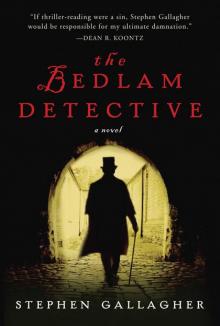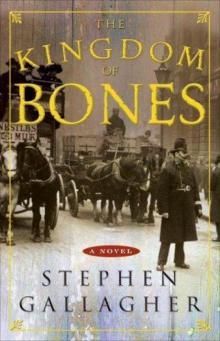- Home
- Stephen Gallagher
The Boat House Page 8
The Boat House Read online
Page 8
He asked her about the place so much like the valley, the place where she'd been born. She said, "They moved everyone. Nobody lives there now."
It was weird. They could speak the same language, but there was almost nothing else in their past that they'd shared. She'd read Shakespeare, Pete hadn't; not unless you counted Julius Caesar at school, which he'd managed to get through with a lot of patience and a set of Coles' Notes. Alina, on the other hand, had never even heard of James Herbert.
One thing that he noticed; every now and again she'd glance at the uncurtained window, as if she was checking the progress of the oncoming darkness. Perhaps she was edgy about something, Pete wondered; but if she was, she kept it well concealed.
Finally, the conversation came back around to the subject of Alina's new job.
She told him that as soon as she had some money she wanted to buy some decent clothes, the kind that she could wear to her work in the evenings. Pete, thinking of the Venetz sisters' reputation for efficiency and attention to detail, asked her if she'd hit any problems over having no social security records or documentation; she currently had the status of an illegal immigrant, after all, and had even dumped her hot French passport as she'd walked out of the air terminal. Alina said, no, no problems… and then amended this to well, not yet. Pete suggested that in a few days' time he could take her out to the nearest big town on the coast, and there she could look for clothes in the department stores and check out the library for the addresses of any useful organisations or people to contact. The sooner she made a move to get some kind of official recognition, the better. She said that this sounded fine. But he wondered if he'd convinced her.
"That is what you want?" he said.
"Of course."
Pete was now beginning to wonder if she was feeling ill; it was almost as if, for the latter part of the evening, she'd only been keeping up a show of enjoying herself and now the strain of the charade was getting through to her.
Or maybe it was the food. That wouldn't have surprised him at all.
He asked her if she was all right and she said, "I'm fine," but it was with a weak smile and her eyes barely focussing on him. "I think I'm just tired." And then she glanced at the window; the darkness outside was complete.
"You go on," Pete said. "I'll clear away."
But Alina got to her feet, causing the candles immediately around her to dip as if in sudden fear. Some of them had burned low, and didn't recover.
"No," she said. "I think I'll take a walk."
"But it's late."
"I know. But I like to walk at night. It helps me to think. Don't worry, I lived in the country before, I know what I'm doing."
"At least take a torch."
"There's a moon. That's all I'll need. Don't wait for me."
The moon was hardly more than a pale sliver, and surely not enough to see by. Pete stood on the porch and tried to make Alina out as she climbed the path toward the highest part of the headland. From there she'd be able to go down to the lakeside if she chose, or else pick up one of the shore paths that would take her further into the valley.
It bothered him to let her go like this, but she'd insisted; for a while he couldn't see her at all, until she reached the skyline and stopped for a moment.
The silence of the valley was like the stillness that sometimes follows a hard rain. Somewhere far off a dog barked, one small sound in a vast and empty theatre.
Alina kicked off her shoes and then went on, descending from sight.
TWELVE
Sometimes it was hard for Gazzer to believe how stupid some people could be.
Take this one, for example; walking along the canal towpath at this late hour of the night, as if it was the park on a pleasant Sunday afternoon and life held no dangers for him at all. The canal route was dark and it was deep and it was a secret vein that ran through the heart of the city, and only the scum dropped down here after hours and expected to survive. Up at street level, on the other side of a high wall, the town centre traffic moved and the neon club lights flickered and police vans stood on street corners waiting for trouble to start. But even the police didn't come down here. Only tramps and serious drunks, and occasionally Toms seeking out shadows in which to do business when the client didn't have a car, and people like Gazzer who didn't give a shit. Gazzer was twenty two years old and had been compared in looks to a pit bull, entirely to the dog's advantage. He wore a T shirt regardless of the season of the year and kept his hair cropped short enough to reveal the half dozen tiny scars on his head where the stubble wouldn't grow. Gazzer had been seriously disappointed in love on this night. His mates had all scored and he inexplicably hadn't, in spite of the money he'd blown on all those lime green cocktails for the bleached slag in the dress with all the red spangles. It was clear that she'd been taking him for a ride, in that there was no ride in it for him at the end of the process. When the evening had ended she'd disappeared into the pub toilet and from there she'd disappeared, full stop.
Gazzer was not only pissed off, he was seriously out of pocket. He didn't mind spending the money if it brought a result, but something like this put the whole world out of balance. Never one to wallow in self pity, he'd started by mugging a couple of Indian kids in bright shirts behind the bus station and then he'd followed a Yuppie type from his bank's Cashcard machine to the stairway of a multi storey car park, where they'd had some dealings involving a Rolex and all the wad in the Yuppie's wallet. After that he'd come down and hopped through a hole in the fence where the canal ran alongside some waste ground, and now he was staying off the streets as he made his way across town and toward home ground. The Indian kids wouldn't matter, but the Yuppie type might get half an hour in the back of a police car checking the pavements and the pub car parks for some sign of his attacker.
Now this. A bonus. An innocent who'd somehow wandered down into the rat run, just asking to get bitten. Gazzer only had to stand in the middle of the towpath and wait as the man approached him. There was nowhere else for the man to go other than back, or into the canal itself.
There were yellow sodium lights down here, but most of them had been broken by kids throwing stones. Odd survivors burned like overhead beacons; there was one under the bridge just ahead, and another one about a hundred yards beyond. They showed the narrow dirt towpath, the black water, the broken windows of empty warehouses…
And the silhouette of the stranger, still walking toward him.
Gazzer flexed his fingers. They cracked like static.
The stranger stopped.
"I'd like to pass, please," he said, and Gazzer's heart soared. A foreigner. He need have no trace of conscience at all.
"Only when I get your money and your watch, fuckface," he said.
"I need money myself," the stranger said pleasantly. "May I see your knife?"
"I don't need a knife," Gazzer said, and he took a step forward to close the gap between them.
Something went wrong.
Gazzer aimed his headbutt, and the stranger moved; he tilted his own head and Gazzer's brains exploded.
That was what it felt like, anyway. Gazzer's legs went and he sat down heavily in the dirt, his nose smashed and his eyes full of tears. The stranger stood over him. He was rubbing the top of his skull just at the hairline, but seemed otherwise unaffected.
Gazzer started to rise. But the stranger reached down and took hold of his nose.
"I wouldn't," he said, as he twisted the broken cartilage and Gazzer's brains went nuclear. His arms flapped in panic, and he screamed. The scream echoed in the depths of the brick canyon.
"The bone can work its way in, you see," the stranger explained as he knelt and checked Gazzer's pockets with his free hand. Gazzer felt the roll of notes being removed from his jeans, but only as some distant background sensation. He reached for the stranger, but the stranger gave his nose another warning tug.
He screamed again.
"I've been down here half the night, waiting for someone l
ike you," the stranger said. "You can keep your watch, I already have one of my own. But I really do need the money."
Gazzer blinked away the tears, and looked into the stranger's face. He was fair, he was young, he was nothing special; but with rare insight, Gazzer saw beyond all of that.
He knew that this was no accidental encounter. He knew that he'd fallen for bait like a fool. And he knew with certainty that the stranger would be capable of doing anything that he threatened.
Anything.
The man released his nose, and straightened.
"Thank you," he said pleasantly.
Gazzer coughed, and spat blood in a terrifying wad.
But the stranger had already turned and walked off into the night, back along the towpath in the direction from which he'd come.
THIRTEEN
Angelica Venetz stands at the rail of the restaurant's terrace. She's watching Walter Hardy — seventy years old, and still the Bay's most reliable handyman — as he moves out with waders and a boathook to take a look under the terrace's decking. Walter is small, thickset, and white whiskered; he does everything with patient slowness and, once started, he's impossible to stop.
"Is there a problem?" a voice from behind Angelica says, and she turns in surprise. She hasn't heard Alina walking across the terrace, and hasn't even been expecting her for another half hour. Alina stands there, her hands in her overcoat pockets, hair tied back and ready for business. She's been with them now for just over a month, and Angelica has never known a worker like her.
"You can bet there's a problem," she says. "Something's stuck under the terrace, and it's drawing the flies."
"What is it?"
"That's what we're going to find out."
Walter, down below them and with the waters getting perilously close to the tops of his waders, says, "Something's rotten under here. You been burying the people you've poisoned?"
"Go on, Walter," Angelica says. "You know perfectly well we put them in the curry."
"Buryin' 'em at sea," Walter persists, and he lifts the boathook and starts to stir around in the darkness beyond the terrace's supporting pillars. The boathook is usually kept on the wall behind the bar. It's a relic from the building's yacht pavilion days, and was originally used for hauling drunks out of the water. Now it catches on something, and Walter's round face tightens with the effort of pulling it free.
"Something there," he says, and he plunges the hook in again, this time with the intention of getting a secure hold so that he can heave out whatever it is into sight. If he can't, Angelica's thinking, it's probably going to mean the expense of having a part of the terrace decking taken up and relaid.
Alina leans on the rail beside Angelica, both of them looking down on Walter as he makes another thrust into the darkness beneath them. Angelica's thinking that a bag of garbage has probably been carried along on the night swell and has become caught up amongst the pillars and the metal cross ties; there will always be somebody who'll think that a couple of heavy stones and a drop out over the deepest part of the lake are an adequate way of disposing of all their empty cans and peelings and plate scrapings.
Now the gulls are starting to circle, taking a big interest. Definitely a bag of garbage, Angelica is thinking.
Walter's managed to get the hold that he needs, but now he's tugging and nothing's happening. He calmly changes his grip, and tries again.
"Come on, Walter," Angelica says. "Put me back in business."
She wouldn't have believed that he could move so fast as, with a rushing like that of fluid from a punctured sac, the rotten body comes slithering out in a wave of its own juices. The boathook is planted deep in its belly, a grotesque fifth limb that rears up into the air as it turns over.
Not a bag of garbage, then. Not unless you're really prepared to stretch the definition.
Finding it difficult to believe how controlled she's being, Angelica says, "Alina, the police constable's car is just across the square. Can you go and get him for me?"
But there's no reply.
Alina is no longer on the terrace.
FOURTEEN
The dead dog under the restaurant deck was to be a talking point for a couple of days, and then interest would shift elsewhere. Walter Hardy used the boathook to push it into the shallows, and then went off to borrow a small motor cruiser so that he'd be able to tow the carcase out to one of the marshy islands further down the lake. Here it could be wedged among the reeds, and would eventually be picked clean. For now the dog lay there, skinless like a rabbit and bloated with decay, awaiting his return. Angelica tried to avoid looking at it, but like the village children who gathered on the bank she found herself almost fascinated. Apart from some of its bones showing, it could have been some alien kind of embryo.
"It was probably hit on the road and then somebody threw it into the lake," Ross Aldridge, the young constable, told her. He was fair and quite softly spoken and actually a little shy looking, and he'd made a point of taking off his uniform cap when he talked to her. "Or else it just died of old age and the owners dumped it. I'll mark it down as a stray."
"So," Angelica said, "nobody's lost a dog around here?"
"If they have, they didn't report it. Without a collar, that's as far as we can go."
Needless to say, the boathook didn't go back to its place on the restaurant's wall. The planking was washed down with Jeyes fluid, and the deck was reopened to take advantage of the increasingly fine weather.
And towards the end of that week, Pete walked over from the yard to see for himself how Alina was doing.
Alina was serving morning coffee on the terrace. She was wearing what appeared to be a borrowed jacket in place of her own heavy overcoat and shawl, something light enough to allow her to carry on even though the sun might go behind a cloud every now and again. Down at the far end of the valley, there was still snow on the upper slopes of the mountains; they looked as if they'd been sugar dusted, with stone walls showing like fine, black veins above the treeline. Against this backdrop, the small Russian girl stood out on her open air stage and put all of her concentration into learning the role of a waitress.
Right now, she was clearing an empty table. From where she was standing, she wouldn't see him. She was backlit by the late morning sun, the diamond greys and blues of the lake and mountains behind her. She was beautiful, serene, a vision by a Dutch master — and, by the terms of their agreement, completely out of his reach.
The thought disturbed him.
He'd nothing to say to her; he didn't even plan to tell her that he'd been to see her. So why, exactly, he now found himself wondering, had he come out to look at her like this?
Nothing came.
He had no ready answer.
And so, feeling faintly and inexplicably troubled, he turned to head back to the yard.
FIFTEEN
"So where does she go every night?" Wayne said as the two of them sat in the empty hull of a partly restored cruiser on the Saturday morning, but Pete could only shrug.
Wayne knew about Alina. Pete's guess was that everybody in the valley knew something about her by now, and nearly all of them would know that she was staying in his house. Nobody apart from Wayne had mentioned it to him, though, which probably meant that while their mouths were shut their minds would be running in overdrive. Well, they'd had a few weeks of mystery, of secrets kept and of wrong conclusions avoided. His hope had been that she might have moved on before the word got around, no chance for gossip and so no awkwardness, but his sense of firm control in that area seemed to have slipped away from him. It wasn't that he minded her presence; and he didn't mind her company, on those occasions when he actually spent time with her.
He simply wished that he didn't have to contend with the unspoken supposition that the two of them were hiding up there on the Step and banging away like a couple of baboons, which he saw in the eyes of more than one person who wished him good morning when he went into town to pick up his mail.
The truth of it was that he was even less certain of her now than he'd been at the beginning; how she thought, the way she might react as the world around her changed. It seemed to be something beyond language, beyond culture; it was a more profound sense of the alien, of their lives as separate rivers with uncrossable ground in between. He could hardly begin to imagine what it must be like for her — everything severed, no turning back, the entire texture of her life abandoned for the deep terror of the new. Little wonder that her scrapbook of photographs appeared to be her dearest possession, or that she prowled the landscape at night like an unquiet spirit. Two evenings back Pete had found his front door open to the darkness, and the porch light on; rain had been falling outside in a continuous silver curtain and in the sheltered area at the top of the steps, Alina's shoes had lain discarded. If there had been a moon that night, the clouds had been keeping it hidden.
"I don't know for sure where she goes," he admitted to Wayne. "I don't even know when she sleeps."
"And she's going to the big party on Saturday?"
"So she says. You bringing Sandy?"
"If it works out." Wayne made his 'desolate and misunderstood' face. "Her mother's having another Wayne hating week." And then he glanced at Pete. "Nothing compared to your problems, though, is it?"
"What do you mean?"
"Well, two women on a string, and at your age."
"I haven't got anybody on a string. Alina's just a guest in the house, she's not a personal masseuse."
And Diane Jackson? Well, Pete decided to say nothing on that subject. Back at the village Post Office he'd sorted out the usual junk mail which never made it past the door of the shop and found that he was left with one real, honest to God letter. He'd opened the envelope and a piece of white card had slid out.
It was a formal invitation for the big party at the Hall; not a specially printed card, but the kind sold over the stationery counter with spaces for the date and the names to be handwritten in. This one was a joint invitation; alongside Pete's name was that of Alina Peterson, the Russian girl's newly adopted identity.

 The Boat House
The Boat House The Bedlam Detective
The Bedlam Detective Valley of lights
Valley of lights The Kingdom of Bones
The Kingdom of Bones